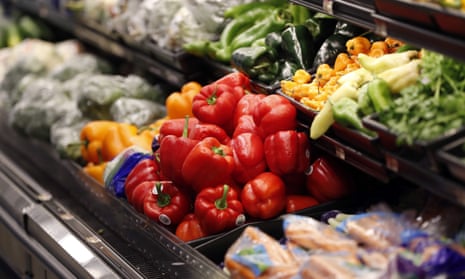Plant-based diet can cut bowel cancer risk in men by 22%, says study
Researchers find no such link for women, suggesting connection between diet and bowel cancer is clearer for men

Eating a plant-based diet rich in vegetables, whole grains, nuts and legumes can reduce the risk of bowel cancer in men by more than a fifth, according to research.
A large study that involved 79,952 US-based men found that those who ate the largest amounts of healthy plant-based foods had a 22% lower risk of bowel cancer compared with those who ate the least.
The researchers found no such link for women, of whom 93,475 were included in the research. The team suggested that the link is clearer for men, who have an overall higher risk of bowel cancer. Their findings were published in the journal BMC Medicine.
“Colorectal cancer is the third most common cancer worldwide and the risk of developing colorectal cancer over a lifetime is one in 23 for men and one in 25 for women,” said the study’s corresponding author, Jihye Kim from Kyung Hee University, South Korea.
“Although previous research has suggested that plant-based diets may play a role in preventing colorectal cancer, the impact of plant foods’ nutritional quality on this association has been unclear. Our findings suggest that eating a healthy plant-based diet is associated with a reduced risk of colorectal cancer.”
For the research, people were asked how often they ate certain foods and drink from a list of more than 180 items. They were also asked about portion size.
Participants could tick that they consumed each food item “never or hardly ever” right up to “two or more times a day”. For drinks, the responses ranged from “never or hardly ever” to “four or more times a day”.
The food groups were classed as healthy plant foods (whole grains, fruits, vegetables, vegetable oils, nuts, legumes such as lentils and chickpeas, tea and coffee), less healthy plant foods (refined grains, fruit juices, potatoes, added sugars), and animal foods (animal fat, dairy, eggs, fish or seafood, meat).
READ RELATED: Get Rid Of Your Turkey Neck With These 4 Exercises, Trainer Says
“We speculate that the antioxidants found in foods such as fruits, vegetables, and whole grains could contribute to lowering colorectal cancer risk by suppressing chronic inflammation, which can lead to cancer,” said Kim.
“As men tend to have a higher risk of colorectal cancer than women, we propose that this could help explain why eating greater amounts of healthy plant-based foods was associated with reduced colorectal cancer risk in men but not women.”
The researchers divided the daily consumption per 1,000kcal into quintiles, from the biggest consumption to the least. On average, men were aged 60 at the start of the study while women were aged 59.
Most people diagnosed with bowel cancer are over the age of 60.
The authors found the link among men also varied by race and ethnicity. For example, among Japanese American men, the reduced risk of cancer was 20% but it was 24% for white men. The team said more research was needed on the differences between ethnicities.
“We suggest that the association between plant-based diets and colorectal cancer risk may have been strongest in Japanese, American and white men due to differences in other colorectal cancer risk factors between racial and ethnic groups,” said Kim. “However, further research is needed to confirm this.”
During the study, 4,976 people (2.9%) developed bowel cancer and factors aside from diet that were likely to influence the results, such as whether people were overweight, were taken into account.
The researchers cautioned that the observational nature of the study meant no conclusions could yet be made about a causal relationship between plant-based food intake and colorectal cancer risk.
Source: Health & wellbeing | The Guardian







